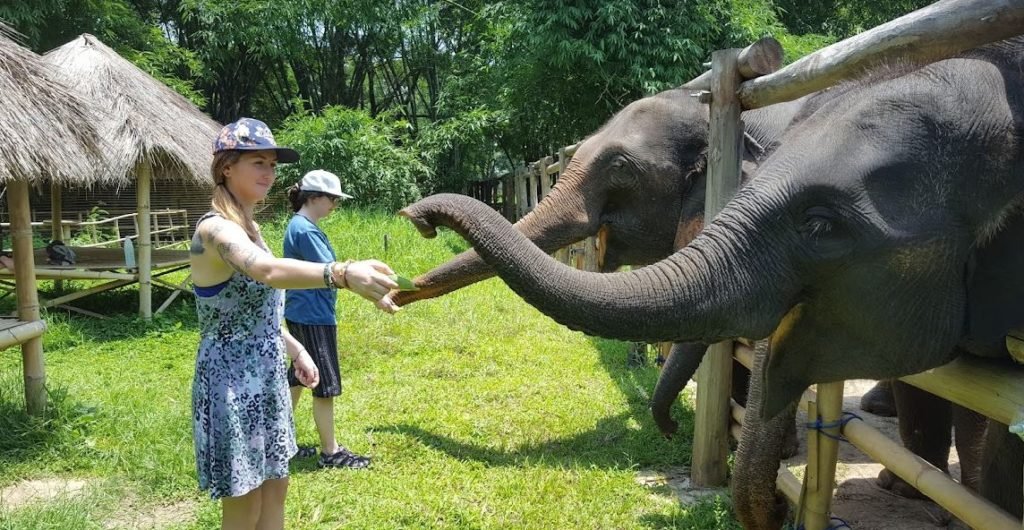Is Riding Elephants in Thailand Cruel? What should you know?
Last updated on December 2nd, 2023
Elephant Experiences in Thailand, What You Should Know?

As travellers visiting new places, we’re always eager to experience the unique things these places can offer. Whether it’s the food, beautiful beaches, art, nightlife, animals or whatever it is that interests each of us individually, there’s something out there for every traveller. It’s natural, it’s part of the thrill most of us travellers spend our lives seeking.
So, when visiting a place that’s so famous for it, why wouldn’t you want to have the breathtaking experience of seeing elephants in Thailand? Of course, you would!
Most people probably have an elephant experience right at the top of their list. After all, elephants are intelligent, kind, playful, gentle giants!
Is riding elephants in Thailand Cruel?
Not all elephant experiences are cruel depending on the situation, but yes, riding elephants in Thailand is cruel. Read on and you’ll find out exactly why.
Why are elephants so special in Thailand?
Asian elephants are known as the symbol of Thailand and have been since ancient times. Their strength, intelligence and bravery are the reasons that they’ve been used in battle with soldiers riding on their backs.
Elephants were often described as warm-blooded armoured tanks.
These treasured animals were associated with power and wealth too and owning lots of elephants gained you more respect. As for the king, prized white elephants were the ones for him.
Religion and superstition also contributed hugely to the respect and love elephants have gained. Thai people believe that elephants are the symbol of fortune.
Buddhism portrays elephants as sacred animals and as Thailand is mainly a Buddhist country this means this powerful animal will always be held in high regard.
Oh, and the Thai word for elephant is ‘Chang’. Ring a bell? Yes, it’s the world-famous Thai beer.

How to see elephants in Thailand in a cruelty-free way?
Follow the flashing lights! There are day tours advertised all over the place! If you want to see an elephant in Thailand it is so easy!
You will literally find flyers everywhere offering you all kinds of experiences with elephants. From two-day trips to live with them in the ‘wild’ while they roam freely, to touching the tied up, tortured creatures on the side of the road. You’ll be offered the opportunity to ride elephants, touch elephants, bathe elephants, feed elephants and even climb all over these spectacular animals.
It’s frighteningly easy to interact with these sacred, strong, brave and intelligent animals, often with no regard for animal welfare.
What are the problems with elephant experiences in Thailand?
We all know this simple fact but sort of push it to the back of our minds….Wild animals are wild!
And ideally, they should live in a truly natural environment.
So, what needs to happen for a wild animal to allow a person to bathe with them, sit on their back or climb on their trunk?
People must be doing something to change how elephants naturally interact with us.
Start swinging from a truly wild elephant’s trunk, I dare you! I’m confident it will not end well!
Riding elephants is not natural, their backs are not built for it and simply put…they don’t like it!
Ways wild elephants in Thailand are tamed:
Mahouts commonly use bullhooks to train elephants – a bullhook is a pole with a metal hook on the bottom. The hook is used to cause pain to sensitive areas on the elephant to force them to follow commands.
Elephant crushing – doesn’t sound good? Well, it’s not! Elephant crushing is a method used to crush elephants’ spirits. The trainers take the babies from their mothers and lock them in tiny cages. Next, the innocent babies are tied up and tortured until their spirits are crushed so they will do exactly as they are told. Then they’re ready to learn how to interact with and entertain tourists.
Other than the blatantly obvious torture that elephants are put through there are plenty of other parts that are just not right.
- Baby elephants are chained to the older elephants while going on a trek and this can get cause injuries while trying to keep up. Their little legs just can’t move fast enough.
- The howdah (the chair on an elephant’s back) can cause long-term damage to the elephant’s spine.
- Elephants are emotionally intelligent animals and experts say their family is extremely important to them. So it can be distressing to break family bonds.
- Have you ever seen the way elephants bathe without humans compared to with humans? Elephants like to splash around and have fun in the water. They are trained to sit still and allow people to have all the fun. That’s no way to live!
To find out more about how elephants and other animals are treated in the tourism industry in Thailand take a look at this: Taken For A Ride: A Report On Asia’s Elephant Tourism
So here’s the big question….
Should you see elephants in Thailand?
In my opinion – YES! You should see elephants in Thailand – BUT with such privilege comes big responsibility.
The most important thing is to find a place that truly cares about the well-being of these majestic animals. In a real elephant sanctuary. How do you do that? Well, the challenge begins here because it takes time to find a true elephant rescue centre. My attitude towards visiting elephants is not just what can I get from my experience but what can I give too.
How to see elephants in Thailand – Don’t be caught out!
A lot of research needs to be done to find the right place. Many places will pose as animal sanctuaries and elephant rescue centres when in reality they might be doing all the horrible things mentioned above.
I was almost fooled while visiting Chaing Mai!
With delight, I found a flyer that seemed to tick all the boxes – no riding – no bathing – no swinging from trunks, all that good stuff. I believed this was a real ethical elephant sanctuary.
I read the flyer from back to front and felt good about it….then I suddenly spotted another flyer with the same elephant sanctuary name. So, I took a closer look and it was the same ‘sanctuary’ BUT this flyer was offering a very different elephant experience, riding elephants and so much more! I was gutted and furious!
Where can I see elephants in Thailand?
There was this incredible place in Chiang Rai called Elephant Valley Thailand. After I did a bunch of research I chose to visit this place. But sadly they have closed down and rehomed the elephants that were living there.
I felt this place was the real deal because it was all about rehabilitating the elephants that had been impacted badly by the tourism and logging industries. They aimed to give them as normal a life as possible. So they encouraged visitors to come and pay fees because housing elephants isn’t cheap, but they allowed very limited interaction, it was always the elephant’s choice. It was mostly about observation.
There was absolutely no chance to ride elephants or bathe elephants there.
Watching these rescued elephants go about their day was more than enough of a fascinating experience for me.
We also spent some time with the guys who worked there clearing off rubbish and glass from a new section of land they wanted to add to their nature park. This felt like a great way to help the elephants and give back a little.
It is such a shame that this place has closed down! It’s closed because they needed the financial support of visitors and, of course, tourism has been limited recently.
Visiting elephants is amazing
…..as long as you do your research and put your money into the right places.
Look for places that are rehabilitating elephants, either to release them back into the wild or to give them a happy safe place to live their lives.
Look for places that don’t allow interaction, a happy elephant isn’t performing tricks or offering taxi services. This means no riding elephants! After all, me sitting on an elephant for the sake of an Instagram pic doesn’t seem worth a lifetime of misery to that animal.
Doing research is the most important thing, don’t just take a flyer’s word for it. This is why you should look at their website, and find out what they are all about. Scour the internet for what others are saying about them. If animal welfare organisations are saying they are good then they probably are.
So, here’s my opinion… seeing elephants in Thailand is not only okay, it’s actually a great thing to do as long as your intention is to give, not just take.
Sometimes it can be hard to tell if something involves cruelty because the process is often hidden. For example, growing up, I believed that eating eggs is perfectly fine and natural. Well, take a look at this post Why Vegans Don’t Eat Eggs. Aren’t they a natural part of a hen’s life? and you’ll see there is a lot more to your eggs on toast than meets the eye.
Meet the Author

Meet Sinead O’Carroll: Vegan explorer, sustainability advocate and the founder of The Wondering Wandering Vegan. Embracing veganism since 2018 and vegetarianism since 2005, Sinead is armed with a Vegan Health, Nutrition and Lifestyle qualification, and is on a mission to share her passion for cruelty-free living.
With a taste for adventure and a heart for eco-conscious choices, she’s here to prove that vegans never miss out on flavour, fun or style. Join her in enjoying the delights of a vegan-friendly world! 🌱✈️🌍
Want to know more? Check out Sinead’s About page here.
Follow me on Instagram to see all the delicious vegan food I find, the vegan and cruelty-free products I use and what I get up to as a travelling vegan.

Comments are closed.